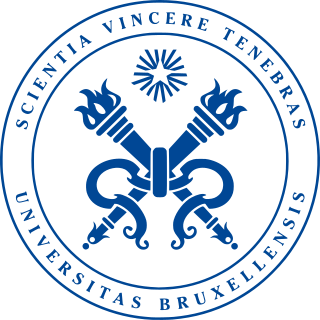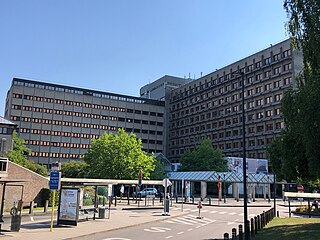
Baron Jean-Louis Vincent is a Belgian physician and Professor of intensive care medicine at the Université libre de Bruxelles and intensivist in the Department of Intensive Care at Erasme University Hospital in Brussels.

Baron Jean-Louis Vincent is a Belgian physician and Professor of intensive care medicine at the Université libre de Bruxelles and intensivist in the Department of Intensive Care at Erasme University Hospital in Brussels.
Jean-Louis Vincent studied at the Université Libre de Bruxelles where he obtained an MD in 1973. Jean-Louis Vincent trained in Internal Medicine and Critical Care at Hôpital d'Ixelles and Hôpital Universitaire St-Pierre in Brussels. He then spent two years training at the University of Southern California with Prof. Max Harry Weil. [1] Jean-Louis Vincent earned his PhD in 1982 at the Université Libre de Bruxelles studying electro-mechanical dissociation during cardiac arrest. Vincent joined the Department of Intensive Care of Erasme University Hospital in Brussels (Université Libre de Bruxelles) in 1979, serving as Head of Department from 1996-2014 and currently as an intensivist consultant.
Jean-Louis Vincent has published more than 1.300 original scientific manuscripts, 1000 review articles and editorials, 400 bookchapters and has edited 123 books. His name appears more than 1300 times in PubMed, and his work has been cited more than 230,000 times with an H-index of 195. Jean-Louis Vincent is the editor-in-chief of Critical Care, Current Opinion in Critical Care, and ICU Management and Practice". Since 1980, he has organized an International Symposium on Intensive Care and Emergency Medicine which is held every March in Brussels. [2] Jean-Louis Vincent is past-President of the World Federation of Societies of Intensive and Critical Care Medicine, [3] the European Society of Intensive Care Medicine, the European Shock Society, the Belgian Society of Intensive Care Medicine and the International Sepsis Forum. He was a Council member of the Society of Critical Care Medicine from 2011-2013. He is a member of the Belgian Royal Academy of Medicine. Since 1980, he is organizing every year in Brussels the International Symposium on Intensive Care and Emergency Medicine (ISICEM).
Jean-Louis Vincent has received several awards for his work with the critically ill: the Distinguished Investigator Award of the Society of Critical Care Medicine, the College Medalist Award of the American College of Chest Physicians, the "Society Medal” (lifetime award) of the European Society of Intensive Care Medicine, and the prestigious Belgian scientific award of the FRS-FNRS (Prix Scientifique Joseph Maisin-Sciences biomédicales cliniques). [4]

Shock is the state of insufficient blood flow to the tissues of the body as a result of problems with the circulatory system. Initial symptoms of shock may include weakness, fast heart rate, fast breathing, sweating, anxiety, and increased thirst. This may be followed by confusion, unconsciousness, or cardiac arrest, as complications worsen.

Sepsis, also known as septicemia, septicaemia, or blood poisoning, is a potentially life-threatening condition that arises when the body's response to infection causes injury to its own tissues and organs.

Intensive care medicine, also called critical care medicine, is a medical specialty that deals with seriously or critically ill patients who have, are at risk of, or are recovering from conditions that may be life-threatening. It includes providing life support, invasive monitoring techniques, resuscitation, and end-of-life care. Doctors in this specialty are often called intensive care physicians, critical care physicians, or intensivists.

The Université libre de Bruxelles is a French-speaking research university in Brussels, Belgium. ULB is one of the two institutions tracing their origins to the Free University of Brussels, founded in 1834 by the lawyer and liberal politician Pierre-Théodore Verhaegen.
The sequential organ failure assessment score, previously known as the sepsis-related organ failure assessment score, is used to track a person's status during the stay in an intensive care unit (ICU) to determine the extent of a person's organ function or rate of failure. The score is based on six different scores, one each for the respiratory, cardiovascular, hepatic, coagulation, renal and neurological systems.

An intensive care unit (ICU), also known as an intensive therapy unit or intensive treatment unit (ITU) or critical care unit (CCU), is a special department of a hospital or health care facility that provides intensive care medicine.

Marc, Baron Henneaux is a Belgian theoretical physicist and professor at the Université Libre de Bruxelles (ULB) who was born in Brussels on 5 March 1955.
Axel Cleeremans is a Research Director with the National Fund for Scientific Research (Belgium) and a professor of cognitive science with the Department of Psychology of the Université Libre de Bruxelles, Brussels.
The Surviving Sepsis Campaign (SSC) is a global initiative to bring together professional organizations in reducing mortality from sepsis. The purpose of the SSC is to create an international collaborative effort to improve the treatment of sepsis and reduce the high mortality rate associated with the condition. The Surviving Sepsis Campaign and the Institute for Healthcare Improvement have teamed up to achieve a 25 percent reduction in sepsis mortality by 2009. The guidelines were updated in 2016 and again in 2021.
Early goal-directed therapy was introduced by Emanuel P. Rivers in The New England Journal of Medicine in 2001 and is a technique used in critical care medicine involving intensive monitoring and aggressive management of perioperative hemodynamics in patients with a high risk of morbidity and mortality. In cardiac surgery, goal-directed therapy has proved effective when commenced after surgery. The combination of GDT and Point-of-Care Testing has demonstrated a marked decrease in mortality for patients undergoing congenital heart surgery. Furthermore, a reduction in morbidity and mortality has been associated with GDT techniques when used in conjunction with an electronic medical record.
The following outline is provided as an overview of and topical guide to emergency medicine:
Emanuel Rivers is a physician born and raised in River Rouge, Michigan which is a suburb of Detroit, MI. He is board certified in emergency medicine, internal medicine and critical care medicine. Rivers has published extensively in the field of shock, sepsis and resuscitation.
Critical Care is an online open access peer-reviewed medical journal covering intensive-care medicine. The founding editor and the current editor-in-chief is Jean-Louis Vincent of the Université Libre de Bruxelles. Critical Care was established in 1997 and is currently published by BioMed Central.
The Sepsis Six is the name given to a bundle of medical therapies designed to reduce mortality in patients with sepsis.

Erasmus Hospital is a teaching hospital in the municipality of Anderlecht, Brussels, Belgium. It is a part of reserch hospital associated with the Université libre de Bruxelles (ULB), and was opened in 1977. It has 1,048 beds and 4,000 employees, treating between 25,000 and 30,000 inpatients and between 350,000 and 400,000 outpatients each year.

Selepressin (INN), also known as [Phe(2),Ile(3), Hgn(4),Orn(iPr)(8)]vasopressin) is a potent, highly selective, short-acting peptide full agonist of the vasopressin 1A receptor and analog of vasopressin which was under development by Ferring Pharmaceuticals for the treatment of vasodilatory hypotension in septic shock.

ERB-196, also known as WAY-202196, is a synthetic nonsteroidal estrogen that acts as a highly selective agonist of the ERβ. It possesses 78-fold selectivity for the ERβ over the ERα. The drug was under development by Wyeth for the treatment of inflammation and sepsis starting in 2004 but development was discontinued by 2011.
The Society of Intensive Care Medicine (SICM) is the representative body for Intensive Care Medicine (ICM) professionals in Singapore.
Paul Ellis Marik is a medical doctor and former professor of medicine who until his resignation in January 2022 served as chair of the Division of Pulmonary and Critical Care Medicine at Eastern Virginia Medical School in Norfolk, Virginia, and was also a critical care doctor at Sentara Norfolk General Hospital. His research interests include sepsis and tissue oxygenation. In August 2023 the American Board of Internal Medicine informed Marik his certification was to be revoked for spreading misinformation.
Vasodilatory shock, vasogenic shock, or vasoplegic shock is a medical emergency belonging to shock along with cardiogenic shock, septic shock, allergen-induced shock and hypovolemic shock. When the blood vessels suddenly relax, it results in vasodilation. In vasodilatory shock, the blood vessels are too relaxed leading to extreme vasodilation and blood pressure drops and blood flow becomes very low. Without enough blood pressure, blood and oxygen won't be pushed to reach the body's organs. If vasodilatory shock lasts more than a few minutes, the lack of oxygen starts to damage the body's organs. Vasodilatory shock like other types of shock should be treated quickly, otherwise it can cause permanent organ damage or death as a result of multiple organ dysfunction.